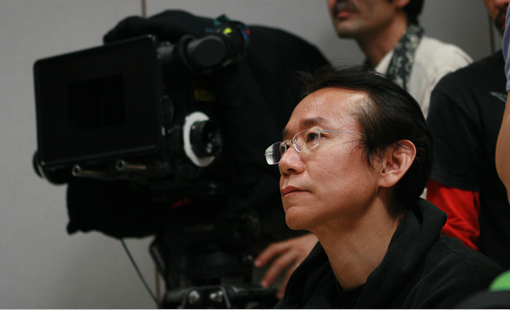
LATEST TOPICS
COMPANY
MASAYUKI SUO 日本語ページはこちら

<PROFILE>
After a childhood spent living and breathing movies and baseball, Tokyo-born Suo entered Rikkyo university to study French Literature. It was there that lectures by esteemed movie critic, Shigehiko Hasumi inspired him to become a film director. After an initial foray into independent movies, he got a leg up when he summoned the nerve to ask director Banmei Takahashi, for a job. The legendary director, who happened to be a regular customer at a bar where Suo's friend was working, gave Suo unpaid unemployment at the telephone switchboard. Suo went on to become an Assistant Director on as many as 10 movies a year for Takahashi as well as other directors in his stable such as Koji Wakamatsu and Kazuyuki Izutsu.
When Takahashi founded the Director's Company in 1982, Suo took the opportunity to open Unit 5, his own filmmaking collective with young colleagues of that era, Isumichi Isomura, Yoshiho Fukuoka, Toshiyuki Mizutani and Akira Yoneda. He was soon churning out scripts and in 1984 his debut as a director was made with "Abnormal Family - My Brother's Bride", a well-received homage to his hero, Yasujiro Ozu. This film put him on the map and offers started to flow in. In 1986 he directed the adaptation of a popular novel "Salaryman Classroom" for TV. His momentum increased when he was entrusted with making the behind-the-scenes documentary of the filming of Juzo Itami's "Taxing Woman" in 1987. This lead him to team up with former Daiei employee, Shoji Masui who produced Suo's "Fancy Dance" in 1989. This film debuted the super star actor, Motohiro Motoki and gave Suo the clout to take on "Sumo Do, Sumo Don't" in 1992 which then won Best Film at the Japanese Academy Awards. He had now arrived on the Japanese film scene and he and Masui created their own production company, Altamira Pictures in 1993. 1996's "Shall We Dance?" swept nearly every category of the 20th Japanese Academy Awards and became a social phenomenon (as well as a Hollywood remake in 2003 starring Richard Gere and Jennifer Lopez). 2007's "I Just Didn't Do It" won a raft of awards and helped catalyse a shift in attitudes within Japan's legal system. He changed gears with "Dancing Chaplin" in 2011, a low-budget documentary about ballet which nevertheless enjoyed a long theatrical run and international festival exposure. In 2012, he reunited the two lead actors from "Shall We Dance?" in "A Terminal Trust", a love story in the context of terminal hospital care. 2014 will see Suo return to his signature entertainment style with "Lady Maiko", a light-heared look at a country girl's unlikely bid to enter the cloistered world of Kyoto's apprentice geisha.
<MOVIE>
| 1984 | Abnormal Family |
|---|---|
| 1989 | Fancy Dance |
| 1992 | Sumo Do, Sumo Don’t |
| 1996 | Shall We Dance? |
| 2007 | I Just Didn’t Do It |
| 2011 | Dancing Chaplin |
| 2012 | A Terminal Trust |
| 2014 | A Terminal Trust |
<BOOK>
| 1991 | “Sumo Do, Sumo Don’t” – Novelization (Ota Publishing) |
|---|---|
| 1996 | “Shall We Dance? The World of Masayuki Suo” (Wise Publishing) “Shall We Dance?” – Novelization (Gentosha Inc.) |
| 1998 | “Shall We Dance? Goes to America” (Ota Publishing) |
| 1999 | “Shall We Dance? Screenplay Translation” (Ai-Iku Publishing) |
| 2000 | “Let’s Head to the Ballpark! – Suo’s Sports Essays” (Kadokawa Publishing) |
| 2001 | “Waiting for India – Travel Essays” (Shuei Publishing) “About a Ballplayer – Atsuya Furuta ” (Ota Publishing) |
| 2002 | “Congratulations, dear fans!” (Dai Takumi Corporation) |
| 2005 | “Shall We Dance? Gets Made in America” (Ota Publishing) |
| 2007 | “I Just Didn’t Do It – Objections about Criminal Justice” (Gentosha Inc.) |
| 2011 | “Masayuki Suo’s Introduction to Ballet” (Ota Publishing) |
